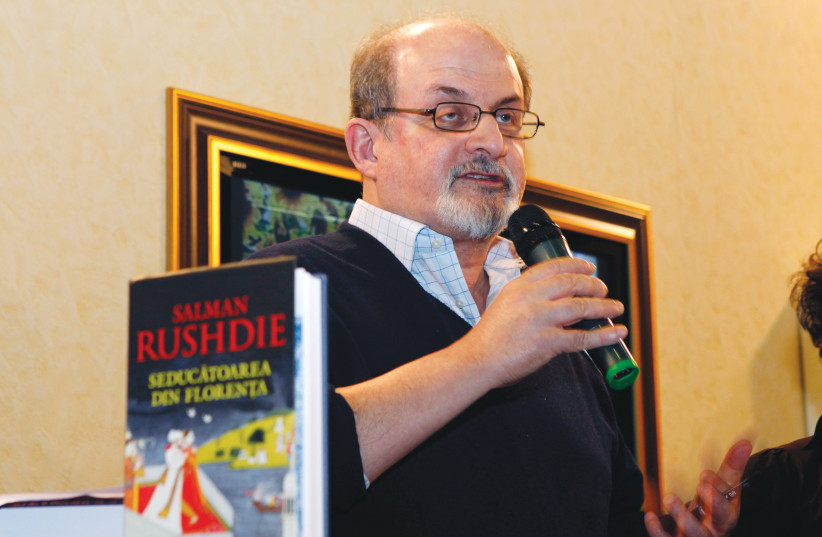The attempted assassination of Salman Rushdie, the author of The Satanic Verses who had long resided in the United States, was both the fulfillment of a decades-old threat and the latest in a string of recent attempts to extend the Iranian regime’s terror campaign to American soil.
The ayatollahs have long used extraterritorial assassinations and terrorist proxies as a twisted form of statecraft. But with the final text for a return to the JCPOA readied and Iranian nuclear enrichment at a record high, the Biden administration may be tempted to simply look past Tehran’s brazenness. That would be a mistake.
Preliminary reports indicate that the assailant, 24-year-old Hadi Matar, born in a Shi’ite family from south Lebanon living in New Jersey, was, if not directed by Tehran, at least inspired by it. Matar expressed admiration for Iran’s Revolutionary Guards, was a fan of Qasem Soleimani, the former head of the Quds Force, and recently tweeted the song “Hello Commander,” a propaganda tune created by the Revolutionary Guards to mobilize its followers.
The threat against Rushdie dates back to 1989, when Ayatollah Ruhollah Khomeini issued a fatwa for The Satanic Verses, which he considered blasphemous. Khomeini’s fatwa urged Muslims to kill Rushdie and offered a bounty. His successor, Ayatollah Ali Khamenei, reaffirmed the fatwa via tweet in 2019, stating that “Imam Khomeini’s verdict on divine verses… [is] not revocable.” A week before the attack, the online Iran newspaper published by the office of President Ebrahim Raisi renewed the call for the murder of Rushdie, and the 15-Khordad Foundation, which Khamenei’s office controls, offered a reward of $3,300,00.
The news of the attack on Rushdie went viral on Farsi media, with conservative media writing, “the apostate Salman Rushdie has [been] consigned to hell.” Fars News Agency published the Khomeini fatwa and wrote: “The experience of dealing with [the author of] Satanic Verses proved to us that adherence to Islamic principles, patience and resistance” are essential for diplomacy’s success. Khorasan, a conservative newspaper, published a picture of Rushdie being taken to hospital captioned “Satan on the way to hell” and wrote that “no matter whether Rushdie will die or not, Imam Khomeini’s fatwa is still credible.”

Hossein Dalirian, an editor at TNA, wrote of Rushdie’s assailant, “blessed be your mother who gave you birth and nursed you.” The Kayhan paper, known as Khamenei’s mouthpiece, declared, “Kudos and bravo to that brave and dutiful man who attacked the wicked apostate Salman Rushdie, and a kiss on his hand that tore apart the neck of the enemy of God with a knife.” Kayhan named former US president Donald Trump and secretary of state Mike Pompeo as the next targets. Hezbollah’s chief Hassan Nasrallah lauded Matar as the “hero of south Lebanon.”
Previous Iranian assassination attempts on American soil
Of course, this is not the first time the Iranian regime has attempted to assassinate foreign and US citizens on American soil. In October 2011, the Quds Force attempted to assassinate Adel al-Jubeir, the Saudi ambassador to the United States, while he dined at Cafe Milano in Washington.
More recently Iranian intelligence operatives plotted to abduct Masih Alinejad, an Iranian-American journalist living in Brooklyn. They hired a private investigator to photograph and record video of Alinejad and her family, and had a camera installed to provide live feed of her home.
After the FBI uncovered the plot, the Iranian regime switched tactics. In July 2022, Iranian intelligence hired Khalid Mehdiyev, an Azerbaijan-born immigrant in New York, to murder Alinejad, but the FBI arrested Mehdiyev before he could act.
Friday’s attack comes on the heels of revelations from the Department of Justice about the Iranian regime’s ongoing campaign to kill former American officials. An unsealed indictment revealed that Shahram Poursafi, aka Mehdi Rezayi, a Quds Force operative in Tehran, attempted to hire a hit man to assassinate former US national security advisor John Bolton. Pompeo and envoy Brian Hook were later revealed to be additional targets in this plot.
The pro-regime voices gleeful about the Rushdie attack were quick to draw a connection to the targeting of these former officials. One hardline activist tweeted, “When it is possible to hit Salman Rushdie in the heart of New York, it is surely possible to consign Trump to hell within America, by God’s grace.”
Though Iran has a long history of killing and kidnapping dissidents and critics residing in other countries, the current spate of Iranian aggression should give us pause. There has seldom been a forceful response to these practices, which has encouraged the Revolutionary Guards to try its hand in America. Even the deterrence established by killing Qasem Soleimani was not permanent. Iran is forever looking for opportunities, probing for weakness.
While the Biden administration has periodically warned Iran of “grave consequences,” a messaging strategy reiterated by National Security Advisor Jake Sullivan after the Department of Justice’s recent announcement, by all indications, the regime is unimpressed. In fact, their willingness to press these attacks as Biden’s envoys supplicate themselves to resurrect the JCPOA are indicative of the low regard they hold for a president they routinely describe as a “wet noodle.” Endless patience and restraint will not improve America’s safety. Strong punitive action is needed to deter the leaders in Tehran.
The writer is a senior research fellow at the Philos Project.
